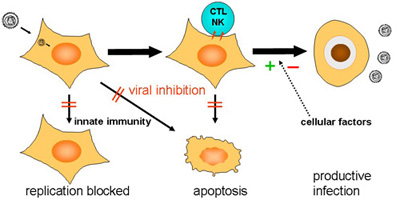Research Group Prof. Dr. Brune

Herpes viruses cause lifelong infections in humans and animals and are controlled by the immune system. Serious disease symptoms often occur only when the host immune system is immature or weakened. Cytomegalovirus (CMV) is an opportunistic pathogen that causes little harm to healthy individuals, but sometimes causes life-threatening illness in immunocompromised individuals (e.g., organ or bone marrow transplant recipients). The virus can also be transmitted to the unborn child during pregnancy and cause permanent damage there.
The department "Virology and Immunology" investigates the interaction between herpes viruses (CMV, KSHV) and the immune defense of the host. Already when the virus enters the host cell, sensors of the cell perceive the infection and activate defense mechanisms with the aim of preventing the multiplication of the pathogen and its spread. During evolution, viruses have acquired the ability to block or bypass these defense mechanisms (collectively known as innate immunity). The department investigates how cytomegaloviruses interfere with cellular defense mechanisms and which of the more than 160 viral proteins play a role in this process. In addition, the department addresses the question of why these viruses can only replicate in cells of their natural host (species specificity) and only in certain cell types (tropism).
